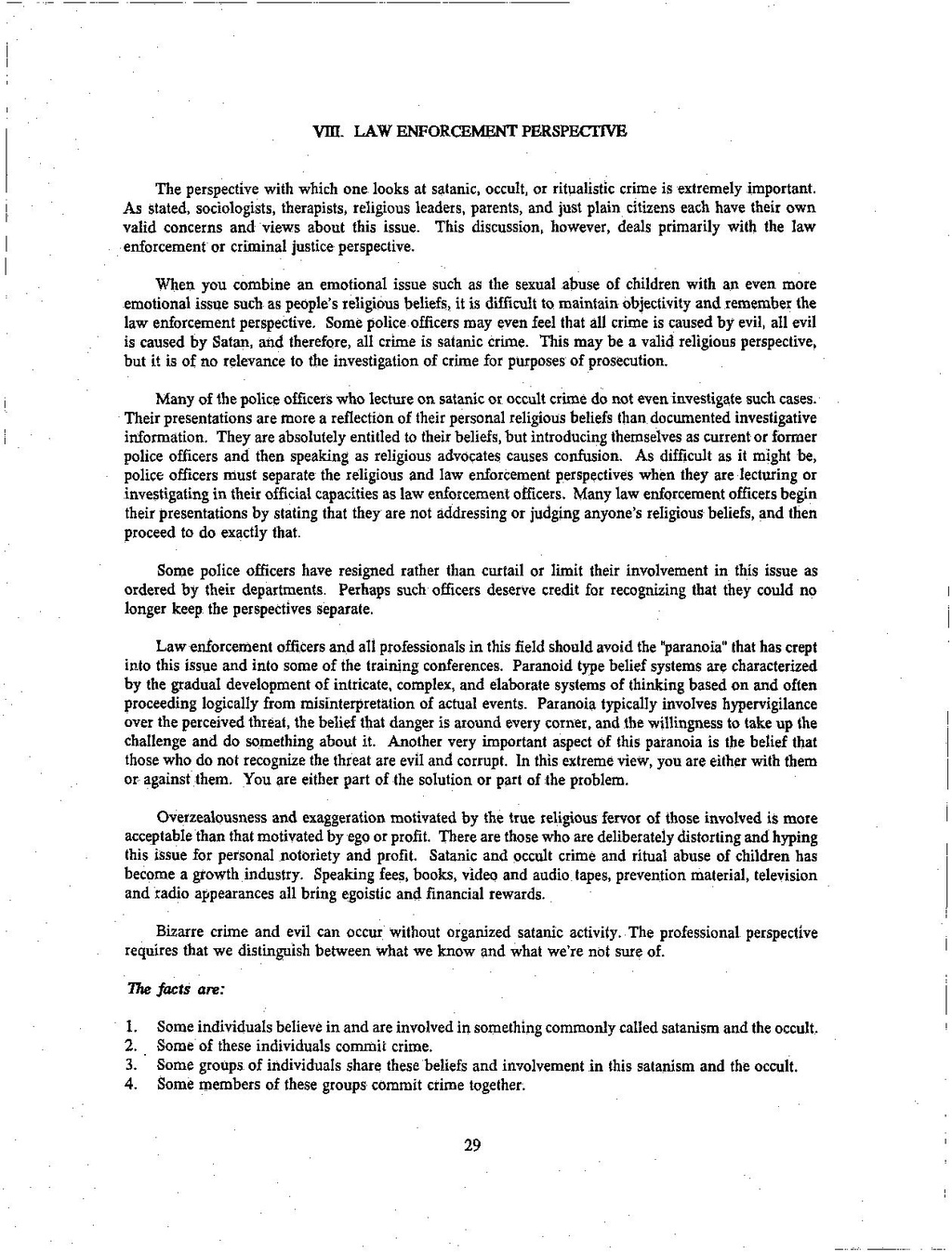VIII. LAW ENFORCEMENT PERSPECTIVE
The perspective with which one looks at satanic, occult, or ritualistic crime is extremely important. As stated, sociologists, therapists, religious leaders, parents, and just plain citizens each have their own valid concerns and views about this issue. This discussion, however, deals primarily with the law enforcement or criminal justice perspective.
When you combine an emotional issue such as the sexual abuse of children with an even more emotional issue such as people's religious beliefs, it is difficult to maintain objectivity and remember the law enforcement perspective. Some police officers may even feel that all crime is caused by evil, all evil is caused by Satan, and therefore, all crime is satanic crime. This may be a valid religious perspective, but it is of no relevance to the investigation of crime for purposes of prosecution.
Many of the police officers who lecture on satanic or occult crime do not even investigate such cases. Their presentations are more a reflection of their personal religious beliefs than documented investigative information. They are absolutely entitled to their beliefs, but introducing themselves as current or former police officers and then speaking as religious advocates causes confusion. As difficult as it might be, police officers must separate the religious and law enforcement perspectives when they are lecturing or investigating in their official capacities as law enforcement officers. Many law enforcement officers begin their presentations by stating that they are not addressing or judging anyone's religious beliefs, and then proceed to do exactly that.
Some police officers have resigned rather than curtail or limit their involvement in this issue as ordered by their departments. Perhaps such officers deserve credit for recognizing that they could no longer keep the perspectives separate.
Law enforcement officers and all professionals in this field should avoid the "paranoia" that has crept into this issue and into some of the training conferences. Paranoid type belief systems are characterized by the gradual development of intricate, complex, and elaborate systems of thinking based on and often proceeding logically from misinterpretation of actual events. Paranoia typically involves hypervigilance over the perceived threat, the belief that danger is around every corner, and the willingness to take up the challenge and do something about it. Another very important aspect of this paranoia is the belief that those who do not recognize the threat are evil and corrupt. In this extreme view, you are either with them or against them. You are either part of the solution or part of the problem.
Overzealousness and exaggeration motivated by the true religious fervor of those involved is more acceptable than that motivated by ego or profit. There are those who are deliberately distorting and hyping this issue for personal notoriety and profit. Satanic and occult crime and ritual abuse of children has become a growth industry. Speaking fees, books, video and audio tapes, prevention material, television and radio appearances all bring egoistic and financial rewards.
Bizarre crime and evil can occur without organized satanic activity. The professional perspective requires that we distinguish between what we know and what we're not sure of.
The facts are:
- Some individuals believe in and are involved in something commonly called satanism and the occult.
- Some of these individuals commit crime.
- Some groups of individuals share these beliefs and involvement in this satanism and the occult.
- Some members of these groups commit crime together.
29
